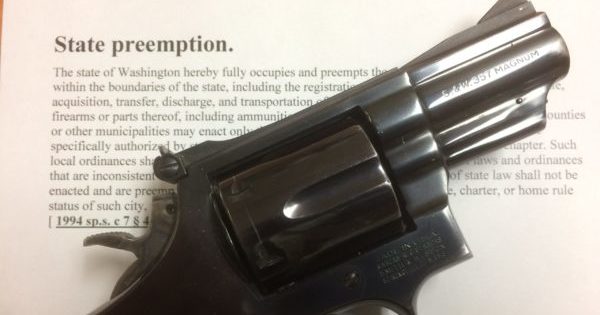
Politico is reporting that the Florida Supreme Court will hear a challenge to the state preemption statute, adopted in 1987 and strengthened by amendment in 2011, saying the case could result in a ruling “on the politically contentious issue of Second Amendment rights in the middle of the 2022 midterms.”
Gun rights are invariably a big issue politically, and state preemption is high on the list of laws the gun prohibition lobby would like to erase, so they could support local efforts to re-establish a checkerboard of conflicting local ordinances to confuse, penalize and ultimately discourage gun owners from exercising their rights.
At issue in the Florida case is the 2011 amendment, which added teeth to the statute. Local governments now could civil penalties of up to $100,000 for violating the state preemption law, Politico reported. Local elected officials could be slapped with fines up to $5,000. The anti-gun Giffords Law Center posted this about the law.
Read the entire text here. Below are excerpts dealing with monetary damages.
Section 3 (c): “If the court determines that a violation was knowing and willful, the court shall assess a civil fine of up to $5,000 against the elected or appointed local government official or officials or administrative agency head under whose jurisdiction the violation occurred…
Section 3, (f)(1): “A person or an organization whose membership is adversely affected by any ordinance, regulation, measure, directive, rule, enactment, order, or policy, whether written or unwritten, promulgated or caused to be enforced in violation of this section may file suit against any county, agency, municipality, district, or other entity in any court of this state having jurisdiction over any defendant to the suit for declaratory and injunctive relief and for actual damages, as limited herein, caused by the violation. A court shall award the prevailing plaintiff in any such suit:
Politico recalled the penalty portion of the law “was the focus of a legal challenge filed by a handful of local governments after the 2018 Marjory Stoneman Douglas High School mass shooting that left 17 dead.”
The trial court, Politico reported, found for the local governments, but a state appeals court overturned the ruling, so the municipalities appealed. In July, state Agriculture Commissioner Nikki Fried, a Democrat now running for governor, appealed to the state high court, and on a 4-7 split, the court accepted the case for review.
Fried turned it into a political issue, releasing a prepared statement that said, “The Supreme Court’s decision to hear our appeals to uphold the constitutionality of the penalty provisions in the preemption of firearm regulation statute is a win for home rule and local control…Once again, Florida Republicans are attempting to punish local governments for taking actions that are completely within their jurisdiction to protect their communities.”
But Attorney General Ashley Moody said in a brief filed last month that if the law allowed local jurisdictions to essentially set their own gun laws, “political subdivisions would have the power to frustrate the ability of the Legislature to set policies for the state.”
State preemption, according to supporters of the idea, provides for uniformity in state gun laws. In Florida’s case, it means what is legal in Miami is also legal in Pensacola. This removes any chance of confusion for Florida gun owners traveling through various jurisdictions. The idea works well enough that it has been adopted by a majority of the states.
Plaintiffs have until Oct. 14 to file their initial brief, Politico said. The briefing schedule “could run until mid-January,” the report noted.